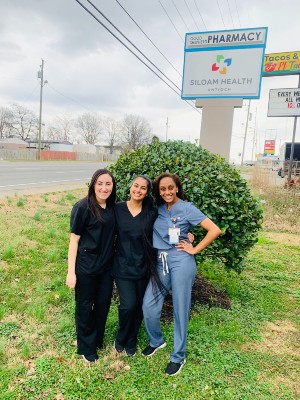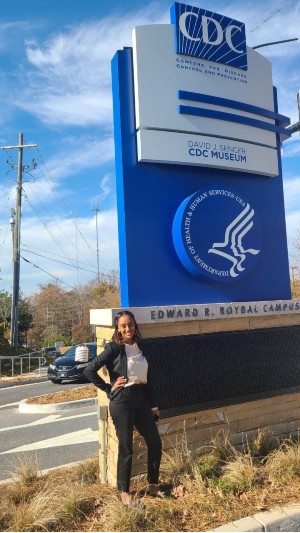Graduate Spotlight: Pharmacy/MHCI grad lands job at the CDC
Sena Seged has already used her clinical training and informatics skills to impact patient outcomes on a national scale.
Janel Shoun-Smith | 615.966.7078 |

When it came time to look for her first full-time position as a pharmacist and a health care informatics expert, Sena Seged (’22) aimed for the very best and hit her target with ease. After graduation on May 7, she will join the National Center for Chronic Disease Prevention and Health Promotion at the U.S. Centers for Disease Control as an informatics pharmacist.
Thanks to seven years of rigorous academic training at Lipscomb and her own go-getter attitude, which earned her a rotation at the CDC and other national honors while still a student pharmacist, Seged was able to secure her avowed dream job even before walking in May’s commencement ceremony to receive her Doctor of Pharmacy and Master of Science in healthcare informatics.
"This is a dream come true for me because it allows me to utilize my clinical training obtained from my Pharm.D. and apply informatics to make guide better health care decision-making," said Seged.
Pharmacy informatics focuses primarily on the use of technology and communications to enhance factors associated with medication administration and patient outcomes resulting from it.
Her hiring at the CDC was no surprise as she has collected quite a few accolades and impressive professional experience during both her undergraduate and her graduate years at Lipscomb University.
Even before entering the College of Pharmacy, the Hendersonville, Tennessee native both volunteered and interned at the Dispensary of Hope in Nashville, a charitable medication distributor. The experience inspired her to find a way to use her “passion for using technology” to “help in patient care.”
“I knew I wanted to play a direct role in patient care by helping patients manage their health through better medication management," she said. "Pharmacists are one of the most accessible health care providers in the community, and it’s astonishing how much patients rely on pharmacists."
While pursuing her dual degree over the past four years, she completed rotations with Amazon’s pharmacy PillPack and at Lifepoint in Brentwood, Tennessee, where she digitally managed hospitals’ lists of prescription drugs covered by insurance, organizing the medications by billing code.
“I remember when deciding where I wanted to go for undergrad, I knew I wanted to stay local and close to my family and my church. Attending a faith-based, Christian institution was important to me and Lipscomb was the perfect fit.”
In the summer of 2020, she spent a month at an internship at PEPID, an international health care information company based in Arizona.

Sena Seged on Bison Square during her undergraduate years.
At PEPID, she prepared patient information pamphlets for a database and gave employees of the company an informational presentation on Novel Monoclonal Antibody (mAb) therapy for COVID-19. Seged worked to assure the quality of PEPID’s drug database by inputting new drug information while also updating and editing existing entries. Later, Seged completed one of her required pharmacy rotation’s with the company.
Seged believes a common misperception among young people going into health care informatics is that the field is more about technology and less about a strong clinical foundation. Her internships and rotations prove that is not the case, she said.
“It is about applying clinical knowledge with the use of information technology to improve patients’ health outcomes,” Seged said. “I saw what I was capable of and how much clinical knowledge I really knew when working at these experiences.”
Then, in her final year of studies, she received word she has been chosen for a rotation at the CDC and became a member of a two-year national task force working to reform the global health system through the power of information and technology.
The Healthcare Information and Management Systems Society’s (HIMSS) TIGER International Task Force (Technology Informatics Guiding Education Reform) was specifically interested in Seged’s informatics background, she said.
In general, most practicing health care informatics professionals start in health care and then return to school to complete advanced education and training in the informatics side. Seged, however, graduated as both a clinically trained pharmacist and a proficient in health care informatics, along with plenty of on-the-job experience.

Sena Segad was one of many students volunteering at nonprofit clinics around Nashville.
So when HIMSS was looking for volunteer members for its TIGER task force to assist in developing a global pharmacy informatics toolkit for professionals, they viewed Seged as an ideal candidate with her combination of education and experience in pharmacy plus informatics.
Seged was the only student selected for the 30-member task force, which has members from Emory Health Care, the Mayo Clinic, WHO, the CDC and other renowned health care organizations. Health care professionals across the nation will use the toolkit developed by TIGER over the next two years.
“Lipscomb is such a leader in the informatics field in the nation, and the HIMSS director recognized that. It is also a well-established program. It is great to see Lipscomb getting this recognition,” said Seged.
It took more than a year for Seged to procure a month-long rotation in the medication safety department at the CDC, where she was able to observe and work with leaders from some of the most powerful and recognizable companies and organizations in the health care field.
“They select only a handful of students from across the country, because they want to provide opportunities for students who are really focused on public health. They want to individualize those opportunities for students and give them attention so they will potentially stay on and work at the CDC,” she said of the rigorous process to obtain the rotation.
“(The CDC rotation) was truly a humbling experience because I was able to see how pharmacists continue to be the backbone and decision drivers in regards to medication use and selection,” she said.
In November, she spent a month working on national-scale efforts to prevent overdoses of over-the-counter medications. For part of her rotation with the CDC, she worked with the PROTECT Initiative (Prevention of Overdoses and Treatment Errors in Children Task Force).
For the rest of her rotation she used coding skills to organize and analyze 60 million rows of data on over-the-counter overdoses from 2014 until now, to discover the most commonly abused OTC medications reported on during that period. That information helped CDC officials create guidelines for medical professionals to help treat and prevent such overdoses nationwide, she said.

Seged did a rotation with the CDC in November.
Before she arrived, her CDC mentors expected that project to take a year just to analyze the data, Seged said. Using her informatics knowledge gained through her master’s level studies at Lipscomb, she was able to synthesize all the data during her one-month rotation.
The database project was a source of great assistance to the CDC because its health professionals who work in the CDC offices, do not always have a strong knowledge of what happens day-to-day in the outpatient world, Seged said. By collecting, organizing and analyzing the data, they were able to see that melatonin, for instance, was one of the most commonly abused OTC supplements, and then use that knowledge to create appropriate guidance to assist medical professionals on these supplements, Seged said.
Having had rotations in ambulatory care and community care already under her belt, Seged was able to provide an on-the-ground viewpoint for the high-level health care leaders she worked with.
At the PROTECT initiative, Seged was a medical scribe who kept track of interactions among leaders from Amazon’s Pharmacy division PillPack, the Federal Drug Administration, Johnson and Johnson, Pfizer and the World Health Organization (WHO), among others.
The PROTECT initiative focuses on preventing OTC overdoses in children, and the task force’s recommendations have already produced a 33% reduction in overdoses among children, Seged said. One example of a situation the task force discussed includes the recent trend of multi-dose packaging, which is convenient for patients, but does not use childproof packaging.
Also during her years at Lipscomb, Seged served as an intern at the Office of Intercultural Development and as a member of the Presidential Ambassador’s Council (PAC), Student Government Association and Student Activities Board. She was part of the group that started Women’s Empowerment Week on campus. She was also a SALT Scholar (Lipscomb’s service-learning honor) and presented at the Student Scholars Symposium in 2018.
During pharmacy school, she served as the Class of 2022’s Vice President, and as a member of Lipscomb's first Diversity and Inclusion Committee through the College of Pharmacy. She also held leadership positions in multiple professional organizations such the American Pharmacists Association-Academy of Student Pharmacists, American Association of Pharmaceutical Scientists, Student National Pharmacist Association and Phi Lambda Sigma Leadership Society.
“If you continue to work hard, and keep the faith, then you can accomplish anything. These past seven years have been some of the most challenging but rewarding years where I have learned and grown so much, academically, professionally and spiritually,” Seged said.